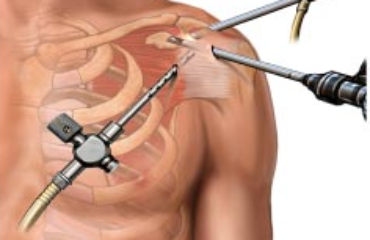Athletes aren’t the only ones who suffer from biceps tendinitis. Older patients may develop acute biceps tendinitis with sudden overuse of the shoulder. Issues with the biceps tendon are often found in younger patients, 18 – 35 years of age if they are active in sports. Sports that involve throwing or excessive arm use, like swimming, baseball, and gymnastics are known to cause acute biceps tendinitis. The risk factors of this condition are:
• Prior rotator cuff tear
• Rheumatoid arthritis
• 40 years or older
• Recurrent tendinitis
• Biceps tendon rupture (contralateral)
• Poor conditioning
Telltale Signs of Biceps Tendinitis
– Biceps tendinitis will bring on pain that is described as a deep, throbbing ache in the shoulder.
– The pain may radiate into the upper arm or down to the hand.
– The pain worsens at night especially if the patient lies on the affected arm.
– Repetitive overhead arm movement, lifting, or pulling on objects can make the pain worse.
– Patients with biceps tendinitis often complain of a deep, throbbing ache in the anterior shoulder.
– The motion of throwing a ball with follow-through causes much pain in the patient.
Biceps Tendinitis is Treatable
Biceps tendinitis may be treated with conservative measures. The patient may do well on nonsteroidal anti-inflammatory drugs (NSAIDs) or may be given acetaminophen if side effects to NSAIDs are an issue. Ice, rest (avoidance of overhead activity) and/or physical activity may be ordered as ![]()
![]() well.
well.
Another treatment is local anesthetic or corticosteroid medication to the bicep tendon sheath. An ultrasonography of the area will determine correct placement of the injection. Doing a local anesthetic injection may be both diagnostic and therapeutic.
For rehabilitation for the athlete, there are four different phases to go through:
– Rest
– Stretching exercises
– Strengthening
– Throwing program
Once the shoulder is pain-free, exercises can be started. The goal of stretching is to regained proper range of motion that is fluid and free of pain.
Surgery is the Last Resort
Sometimes conservative measures do not take care of the problem with biceps tendinitis. If there is no improvement after three months of these measures, surgery will be considered. Surgical intervention may include having debridement done if less than 50 percent of the bicep tendon is torn. Any primary or secondary impingement found would be removed and tendon repaired if needed. If there are serious tears or any rupturing, a biceps tenodesis would be necessary. This would entail reattaching the cut bicep tendon and anchoring it on the arm bone. This will help alleviate the pain by removing pressure from the cartilage rim of the shoulder sockets. Additionally, a part of the biceps tendon is surgically removed. Tenodesis is the treatment that appeals to younger people under the age of 60 years of age. This includes people who are active and do not want to have a muscle bulge above the elbow.
A tenotomyis usually done for patients who are older than 60 years old who are inactive and have a ruptured biceps tendon.Essentially, the surgeon releases the damaged bicep from its attachment. This is a simple procedure, however, there will be a “Popeye” bulge left in the arm that will not go away.


